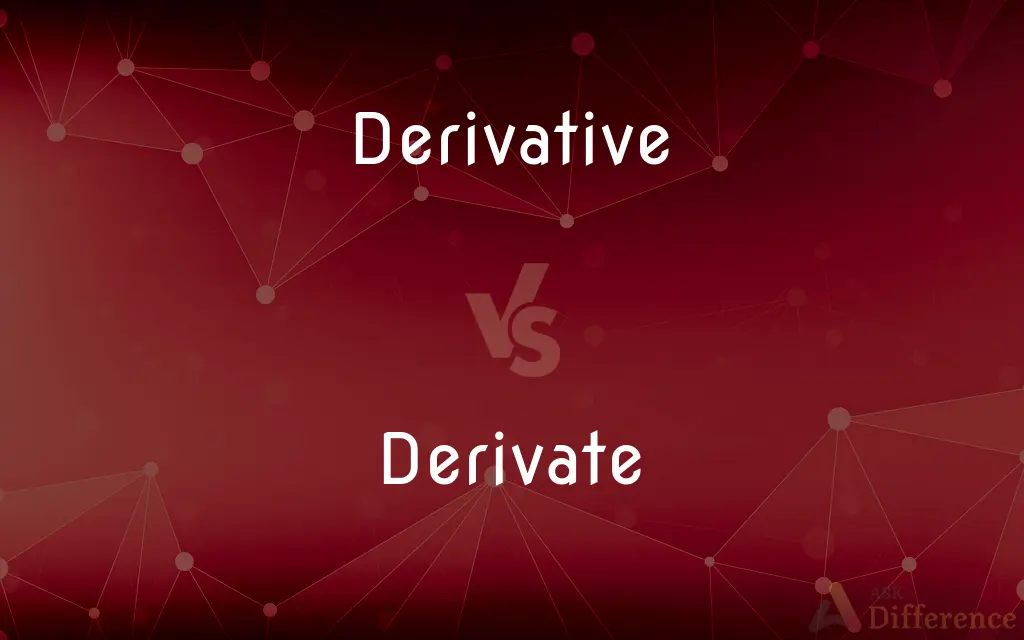Derivative vs. Derivate — What's the Difference?
By Urooj Arif & Maham Liaqat — Updated on March 11, 2024
"Derivative" and "derivate" are terms often encountered in mathematics and finance, but they have distinct meanings and applications. "Derivative" is widely used and understood, while "derivate" is less common and can be considered a less standard form.

Difference Between Derivative and Derivate
Table of Contents
ADVERTISEMENT
Key Differences
A "derivative" in mathematics refers to a fundamental concept in calculus, representing the rate at which a function changes at any given point. It is used to find slopes of curves and rates of change, among other things. "Derivate," on the other hand, is a term you might occasionally encounter, but it is much less common and often considered a less standard or incorrect variant of "derivative."
In finance, a derivative is a complex financial security with a value that is reliant upon or derived from, an underlying asset or group of assets—a common example being options or futures. In some contexts, particularly in non-English speaking countries or in older texts, "derivate" might be used interchangeably with "derivative," but its usage can lead to confusion and is generally avoided in favor of the more universally accepted "derivative."
The use of "derivative" spans various disciplines, indicating something that has been derived from another source. In art and literature, for example, a work might be described as derivative if it heavily borrows elements from another source without significant originality. In contrast, the rare use of "derivate" limits its impact and recognizability. While it might appear in specific niches or older texts, its utility is overshadowed by the broad acceptance and multifaceted application of "derivative."
Comparison Chart
Definition
In calculus, it represents the rate of change of a function. In finance, a security whose value is dependent on an underlying asset.
Less standard variant of "derivative," occasionally used but generally considered less correct.
Usage
Widely used in mathematics, finance, and other fields to denote something derived from another source.
Rarely used and often avoided to prevent confusion.
ADVERTISEMENT
Disciplinary Application
Across various fields, including calculus, finance, art, and literature.
Limited, often seen in specific niches or older texts.
Recognition
Universally recognized and understood in both academic and professional contexts.
Limited recognition, potentially leading to ambiguity.
Utility
High, due to its clear definition and broad applicability across different disciplines.
Low, given its rare usage and potential for confusion.
Compare with Definitions
Derivative
Measures the rate at which a function's output changes with respect to its input.
The derivative of the function f(x) = x^2 is 2x, indicating how f(x) changes at any point x.
Derivate
Occasionally used as an alternative to "derivative," but less standard and can lead to confusion.
Derivate products might appear in older texts or translations but are generally referred to as derivative products in modern usage.
Derivative
A financial instrument whose value depends on the value of other underlying assets.
Options are derivatives that give the holder the right, but not the obligation, to buy or sell an asset at a predetermined price.
Derivate
Limited, with a tendency to be replaced by "derivative" in most contexts.
The use of derivate in academic papers is rare and may be corrected during peer review.
Derivative
Broadly recognized in academic, scientific, and professional domains.
Derivative markets play a crucial role in financial hedging strategies.
Derivate
Its application is constrained by its limited acceptance and recognition.
In academic settings, derivate might be seen in the context of historical texts or translations.
Derivative
Finds application in various fields beyond mathematics and finance, including physics, engineering, and economics.
In physics, derivatives help describe how physical quantities change over time.
Derivate
Not widely recognized or accepted, particularly in formal or professional discourse.
Financial professionals rarely use derivate when discussing financial instruments.
Derivative
Essential for understanding and analyzing dynamic systems, financial models, and creative works.
Understanding derivatives is crucial for economists modeling the rate of change in markets.
Derivate
Offers limited utility due to its ambiguous recognition and potential for confusion.
The clarity of communication can be compromised when derivate is used instead of the standard term derivative.
Derivative
In mathematics, the derivative of a function of a real variable measures the sensitivity to change of the function value (output value) with respect to a change in its argument (input value). Derivatives are a fundamental tool of calculus.
Derivate
Derivative.
Derivative
Resulting from or employing derivation
A derivative word.
A derivative process.
Derivate
Derived; derivative.
Derivative
Copied or adapted from others
A highly derivative prose style.
Derivate
Something derived; a derivative.
Derivative
Something derived.
Derivate
(obsolete) To derive.
Derivative
(Linguistics) A word formed from another by derivation, such as electricity from electric.
Derivate
Derived; derivative.
Derivative
The limiting value of the ratio of the change in a function to the corresponding change in its independent variable.
Derivate
To derive.
Derivative
The instantaneous rate of change of a function with respect to its variable.
Derivative
The slope of the tangent line to the graph of a function at a given point. Also called differential coefficient, fluxion.
Derivative
(Chemistry) A compound derived or obtained from another and containing essential elements of the parent substance.
Derivative
A financial instrument that derives its value from another more fundamental asset, as a commitment to buy a bond for a certain sum on a certain date.
Derivative
Obtained by derivation; not radical, original, or fundamental.
A derivative conveyance
A derivative word
Derivative
Imitative of the work of someone else.
Derivative
Referring to a work, such as a translation or adaptation, based on another work that may be subject to copyright restrictions.
Derivative
(finance) Having a value that depends on an underlying asset of variable value.
Derivative
Lacking originality.
Derivative
Something derived.
Derivative
(linguistics) A word that derives from another one.
Derivative
(finance) A financial instrument whose value depends on the valuation of an underlying asset; such as a warrant, an option etc.
Derivative
(chemistry) A chemical derived from another.
Derivative
(calculus) One of the two fundamental objects of study in calculus (the other being integration), which quantifies the rate of change, tangency, and other qualities arising from the local behavior of a function.
Derivative
The derived function of : the function giving the instantaneous rate of change of ; equivalently, the function giving the slope of the line tangent to the graph of . Written or in Leibniz's notation, in Newton's notation (the latter used particularly when the independent variable is time). Category:en:Functions
The derivative of is ; if , then
Derivative
The value of such a derived function for a given value of its independent variable: the rate of change of a function at a point in its domain.
The derivative of at is 12.
Derivative
(Of more general classes of functions) Any of several related generalizations of the derivative: the directional derivative, partial derivative, Fréchet derivative, functional derivative, etc.
Derivative
(generally) The linear operator that maps functions to their derived functions, usually written ; the simplest differential operator.
Derivative
Obtained by derivation; derived; not radical, original, or fundamental; originating, deduced, or formed from something else; secondary; as, a derivative conveyance; a derivative word.
Derivative
Hence, unoriginal (said of art or other intellectual products.
Derivative
That which is derived; anything obtained or deduced from another.
Derivative
A word formed from another word, by a prefix or suffix, an internal modification, or some other change; a word which takes its origin from a root.
Derivative
A chord, not fundamental, but obtained from another by inversion; or, vice versa, a ground tone or root implied in its harmonics in an actual chord.
Derivative
An agent which is adapted to produce a derivation (in the medical sense).
Derivative
A derived function; a function obtained from a given function by a certain algebraic process.
Derivative
A substance so related to another substance by modification or partial substitution as to be regarded as derived from it; thus, the amido compounds are derivatives of ammonia, and the hydrocarbons are derivatives of methane, benzene, etc.
Derivative
The result of mathematical differentiation; the instantaneous change of one quantity relative to another; df(x)/dx
Derivative
A financial instrument whose value is based on another security
Derivative
(linguistics) a word that is derived from another word;
`electricity' is a derivative of `electric'
Derivative
Resulting from or employing derivation;
A derivative process
A highly derivative prose style
Common Curiosities
Can "derivate" and "derivative" be used interchangeably?
Although they might be used interchangeably in some contexts, "derivative" is the standard term and is preferred for clarity.
Are derivatives only financial instruments?
No, the concept of derivatives extends beyond finance to include mathematical rates of change and derivative works in art and literature.
How important is it to understand derivatives in mathematics?
Understanding derivatives is fundamental in calculus and essential for studying rates of change and slopes in various scientific and engineering fields.
Is "derivate" an acceptable term in professional settings?
While it might be understood, "derivative" is the preferred and widely accepted term in professional settings.
Is there any context where "derivate" is preferred over "derivative"?
"Derivate" may appear in specific historical or niche contexts, but "derivative" is preferred for modern usage.
Why is "derivative" more commonly used than "derivate"?
"Derivative" has a clear, established meaning across multiple disciplines, making it more universally accepted and used.
Can the misuse of "derivate" lead to misunderstandings?
Yes, using "derivate" instead of "derivative" can lead to confusion, especially in formal academic and professional contexts.
Does the use of "derivate" in academic writing affect credibility?
It might, as "derivative" is the standard term; using "derivate" could be seen as a lack of familiarity with the correct terminology.
How does the concept of a derivative apply to the art world?
In art, a derivative work is one that is based on or derived from another existing work, often involving elements such as style, theme, or composition.
What skills are necessary to work with derivatives in finance?
Working with financial derivatives requires an understanding of financial markets, risk management, and the specific mechanisms of various derivative products.
Share Your Discovery

Previous Comparison
Graffiti vs. Grafitti
Next Comparison
While vs. WhilesAuthor Spotlight
Written by
Urooj ArifUrooj is a skilled content writer at Ask Difference, known for her exceptional ability to simplify complex topics into engaging and informative content. With a passion for research and a flair for clear, concise writing, she consistently delivers articles that resonate with our diverse audience.
Co-written by
Maham Liaqat














































